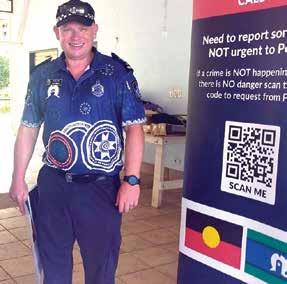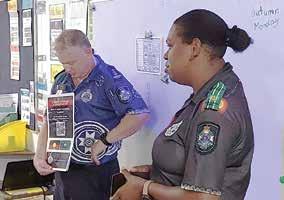
3 minute read
QR code on trial in Badu, Saibai and NPA for simpler reporting of non-urgent crime
Torres Strait police have launched a trial of an alternative method for community members to report non-urgent crime.


The trial hopes to encourage the sharing of crime information in one of Queensland’s most difficult to access regions.
Community members in three trial locations will be able to make brief initial contact with Policelink via a QR code instead of providing detailed information over the phone or visiting the website to complete a form.
They said the Torres Strait patrol group area, which includes all the islands of the Torres
Strait and the Northern Peninsula Area (NPA), presented a uniquely challenging environment for policing.
Patrol Inspector Nick O’Brien has led the patrol group for two years, and said police believed there was substantial under-reporting of non-urgent crime in this strategically important region.
“We have police stationed on Thursday Island, Horn Island and at Bamaga on the tip of Cape York,” Inspector O’Brien said.
“The remaining 14 islands, encompassing 15 different communities ranging in size from 40 people to 900 people, have no permanent police presence.
“To combat this, we conduct regular patrols in our Water Police vessels and place priority on engaging with our local communities.
“Police are able to respond to urgent Triple Zero calls for assistance by boat, plane or helicopter, but when it comes to reporting non-urgent crime to Policelink, we are finding our community members are less inclined to reach out.
“We realised we needed to have a new strategy for non-urgent reporting in the Torres Strait and we worked with Policelink to develop the QR Code reporting option.”
Inspector O’Brien said language difficulties and a lower reliance on personal computers were significant barriers that the QR code was designed to overcome.
“English is not always the first language for our community members, especially those living in the outer islands.
“It can be challenging talking to someone on the phone in another part of the state who doesn’t understand where you are calling from or what you are saying.
“People get frustrated and just hang up.
“If they go to the Policelink website, it can be challenging to fill out the report form.
“Our local community members all have phones however, and are enthusiastic users of social media, so entering a small amount of data on a phone is not a problem for them.”
When users scan the QR Code with their phone, a simplified form appears requiring short answers to just four questions – name, location, contact phone number and a drop-down menu listing 10 crimes.
Users are directed to dial Triple Zero (000) if a crime is in progress or lives are in danger.
When the user clicks the ‘submit’ panel, the report is identified as coming from the Torres Strait and NPA trial area and a Policelink Client Service Officer sends a message to the local police station to contact the sender for more information.
Inspector O’Brien said the local police were much more likely to get information using this method.
“Our community members are often reluctant to talk to people they don’t know, but are more likely to talk to a police officer who is local and whom they possibly already know,” he said.
“Follow up can be much more discreet if they are talking to an officer with local knowledge rather than speaking loudly to a stranger who doesn’t understand you.”
The QR code reporting trial was launched with community engagement events and school visits on Saibai Island, Badu Island and at Bamaga early last week.
“We gave out large fridge magnets, business cards and easy to follow instructions and conducted a few practice runs to show people they can contact us discreetly with just a few taps on their phone,” Inspector O’Brien said.
“Police rely on community members to report crime so we can help ensure the safety of our people and their livelihoods.
“We conduct regular land and sea patrols, but this QR Code communications strategy will enable us to prevent, disrupt and respond to crimes which we otherwise may not have identified.
“Boat theft is a real concern; up here it’s like losing the family car. If we don’t know about crimes however, we can’t help.
“The Torres Strait and NPA is also our only international border and can be utilised as a route for illegal smuggling, so it’s even more important for our local communities to feel comfortable reporting non-urgent crime and suspicious behaviour.”
The trial, if successful, will be rolled out to the majority of the other islands in the Torres Strait.
While the trial has only just started, Thursday Island police recorded two QR code notifications on the first day from Saibai Island.
Torres Strait police thanked Policelink staff and local Torres Strait and NPA councils for supporting the new initiative.







